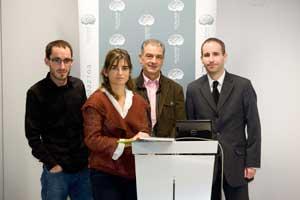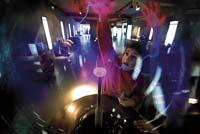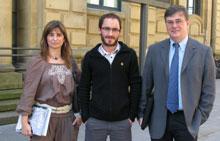Looking for the place of science and technology in society
2009/11/12 Lakar Iraizoz, Oihane - Elhuyar Zientzia
With the aim of covering this gap, the Elhuyar Foundation, together with the Sociological Prospecting Cabinet of the Basque Government, began in 2008 the work "Scientific and technological representations in Euskal Herria (2008)". The works were presented yesterday at the headquarters of the Elhuyar Foundation.
The study was approached from three areas. On the one hand, a qualitative analysis was carried out, for which groups of discussion were created with the ordinary citizenship of the whole Basque Country, with students and researchers of science and technology, with students of human and social sciences, and interviews were carried out with experts in science and technology.
On the other hand, quantitative data on social perception were obtained. 3rd Social Perception of Science and Technology by the Spanish Foundation for Science and Technology (FECYT) in collaboration with the CIS in 2006. They have used the information collected in the National Survey. The Elhuyar Foundation analyzed in 2008 the presence of issues related to science and technology in the newspapers of Euskal Herria. The results of this study were published in the November 2008 issue of Elhuyar Zientzia eta Teknika, and more details of this study will be available in the next issue of the magazine, December.
The advantages and drawbacks of science
One of the main conclusions that can be drawn from these studies is that society in general extolls science and technology. In the discussion groups it has been collected, for example, that thanks to the new sciences and technologies, we have a much more comfortable life, a greater life expectancy and a much better communication capacity. People believe that research and development are fundamental to the development and well-being of peoples.
Scientists are also among the most valued groups in society. In fact, the quantitative analysis has shown that the professions related to science occupy the top three positions in the list of most valued professions: the doctors occupy the first place, since on a scale of 1 to 5 they have obtained an average of 4.4 points, compared to the citizens and the scientists and the engineers in the second and third, with 4 points and 3.8 points respectively.

Despite their praise and social function, science and technology also see less positive and dangerous aspects. People believe that certain ethical limitations, such as human cloning or the manipulation of embryos, have been overcome. In general, quantitative analysis reveals that 41.5% of the population considers that the benefits derived from science and technology are greater than the damage. 37.5% points out that the benefits and losses are comparable and 8.5% that the damage is greater than the benefits.
In addition, they point out that through advertising and marketing, many brands generate needs in citizenship. "We don't give up buying, we are trapped and we don't see any way out," says one participant. They unanimously indicate that in the discussion groups we are turning on a crazy wheel.
More strength is needed
The desire to understand the world, to find new things, to feel the gratitude of society and to make money, among other things, make people become a scientist and participate in research.
However, people believe that the vocation and spirit of the first moment of researchers is weakening, because politicians do not give the importance that science, technology and innovation deserve. For all this, they believe that researchers want to go abroad. In general, it is considered that foreign countries, especially Europe and the United States, invest more money in science and technology and that the research system is better organized. People believe that in Euskal Herria the working conditions are very precarious for researchers, and also researchers have the pressure to obtain results.
Faced with this situation, society demands a restructuring of scientific policies. Changes should be directed towards the well-being, stabilization of research, and safety of researchers. Thus, non-profitable areas should also be considered. People believe that "not investing in science and technology is not believing in the future."
In the ACBC a point of optimism is detected, the population considers that there are indications of change. That is, organizations have realized the new challenges and challenges and have begun to bet on promoting the research of science and technologies. Specifically, they mentioned Innobasque and, in particular, Ikerbasque as an example of change.
In Navarre and Iparralde, for their part, they have been renovated. In the North Basque Country, moreover, they see administrative changes as essential for the advancement of science and technology. In fact, they consider it fundamental that there is a university in the Basque Country.
It is not of public interest
Despite its importance, citizenship is not very interested in issues related to science and technology, at least in those that are not useful to them in their daily lives. In other words, citizenship has an interest in science and technology as they directly influence their lives. Thus, three areas of interest of science and technology stand out: information and communication technologies, whether Ippodas, Mp3, IT, Internet, etc. ; the environment, renewable energies and sustainable development; and health and medicine.
This citizen attitude has its direct reflection in the media. In fact, the results of the press study have revealed that the topics related to technology, health, computer science and the environment are the ones that most appear in the newspapers. It has also been clear that newspapers do not think much about science, technology and innovation, let alone their own opinions.
The analysis has also shown that the majority of the texts (1,089) are of very little importance, taking as criterion the scale of importance of Richard Budd (based on the size of the news, on the space it occupies, on the number of the page and on the graphical use), while the texts of total importance have been only 55.
With this study, a basis is established to know where we are. We will hardly know what to offer in the communication of science, in scientific policies, in education, etc. without knowing the starting point.

Gai honi buruzko eduki gehiago
Elhuyarrek garatutako teknologia





